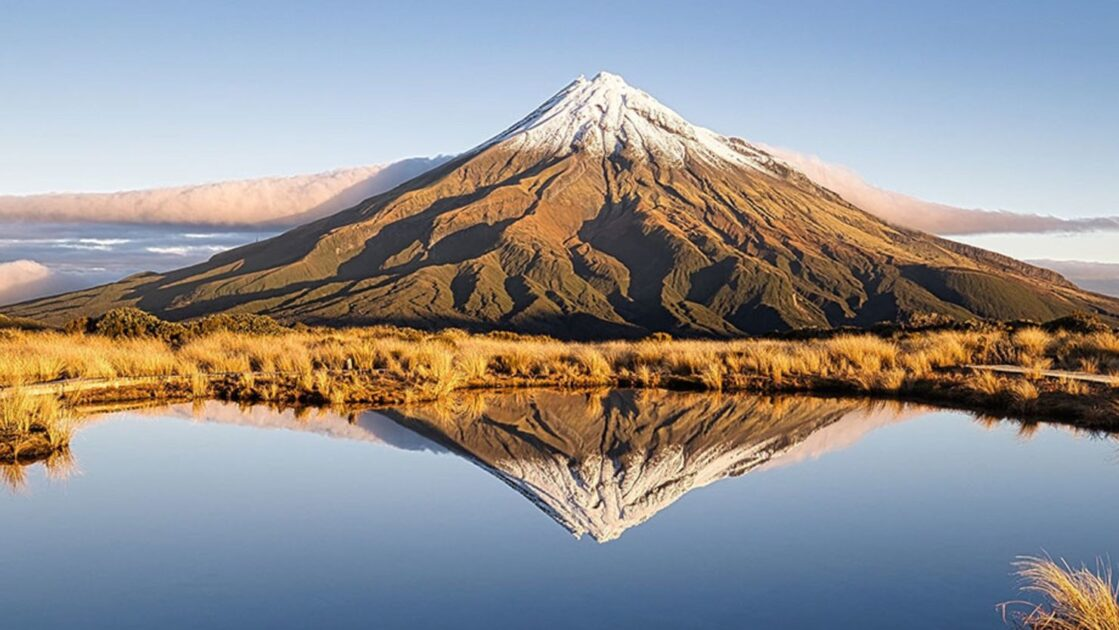New Zealand’s parliament has passed a landmark bill that grants Mount Taranaki the same legal rights as a person. This historic move reflects the Māori worldview and addresses the injustices faced by indigenous communities during colonization.
Recognizing the Rights of Mount Taranaki
Mount Taranaki, also known as Taranaki Maunga, holds immense cultural and spiritual significance for the local Māori tribes, or iwi. For centuries, the mountain has been regarded as a living ancestor, embodying the deep connection between the land and the indigenous people.
The Taranaki Maunga Collective Redress Bill, recently passed into law, legally acknowledges this relationship by granting the mountain personhood status.
This means that Mount Taranaki effectively “owns itself,” with its interests represented by a governance structure comprising local iwi and government officials. The bill also replaces the mountain’s colonial name, Egmont, with its Māori name, Taranaki Maunga, and restores the traditional names to the surrounding national park.
Read : First Loss of New Zealand naval vessel since World War Two Due to Autopilot Errors
The legislation serves as an act of restorative justice for the Māori people of the Taranaki region, who suffered immense losses during colonization.
Read : Holes Spotted in Screen Built to Block View of Mt. Fuji in Japan
The 1860s saw widespread confiscation of land, including Mount Taranaki and over a million acres of surrounding territory. This act of legal recognition, coupled with a formal government apology, aims to address these historical grievances and affirm Māori sovereignty over their ancestral lands.
A Landmark Settlement for Māori Rights
The Taranaki Maunga settlement is part of New Zealand’s broader efforts to honor the Treaty of Waitangi, signed in 1840 between the British Crown and Māori chiefs.
The treaty guaranteed Māori certain rights to their land and resources, but many of its provisions were violated during colonization, resulting in significant harm to indigenous communities.
Paul Goldsmith, the government minister responsible for the negotiations, emphasized the importance of acknowledging past injustices to pave the way for a more equitable future.

“We must acknowledge the hurt that has been caused by past wrongs so we can look to the future to support iwi to realize their own aspirations and opportunities,” Goldsmith stated.
The settlement also ensures that public access to Mount Taranaki remains unchanged. All New Zealanders, regardless of background, can continue to visit and appreciate the natural beauty of the mountain and its surrounding national park. This inclusivity underscores the shared value of the mountain while respecting its sacred status to the Māori people.
A Step Toward Environmental and Cultural Harmony
Mount Taranaki is the latest natural feature in New Zealand to be granted legal personhood, following the Urewera native forest in 2014 and the Whanganui River in 2017.
These groundbreaking legal recognitions reflect a shift in environmental and cultural perspectives, where natural entities are seen not merely as resources to be exploited but as living beings with inherent rights.
Debbie Ngarewa-Packer, co-leader of the Māori Party and a member of one of the eight Taranaki iwi, described the passing of the bill as a moment of liberation for the mountain.

“Today, Taranaki, our maunga [mountain], our maunga tupuna [ancestral mountain], is released from the shackles, the shackles of injustice, of ignorance, of hate,” she said.
The Māori worldview, which sees natural features as ancestors and living entities, offers a powerful framework for environmental stewardship and sustainability.
By granting personhood to Mount Taranaki, New Zealand not only honors its indigenous heritage but also sets an example for addressing environmental challenges through legal innovation.
This legal recognition encourages a collaborative approach to managing the mountain, with the iwi and government working together to protect its ecological and cultural integrity. It also provides a platform for the Māori community to exercise their rights and responsibilities as guardians of the land, known as kaitiakitanga.

